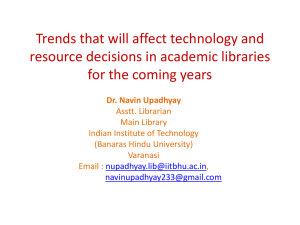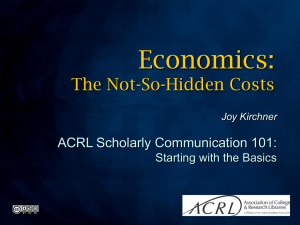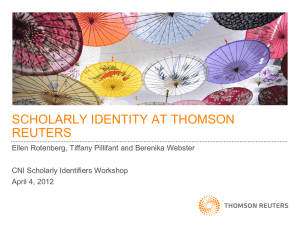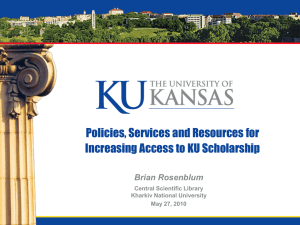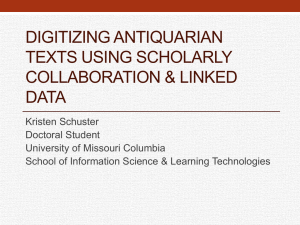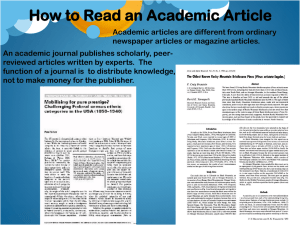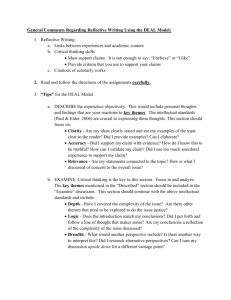- Web-based Information Science Education (WISE)
advertisement
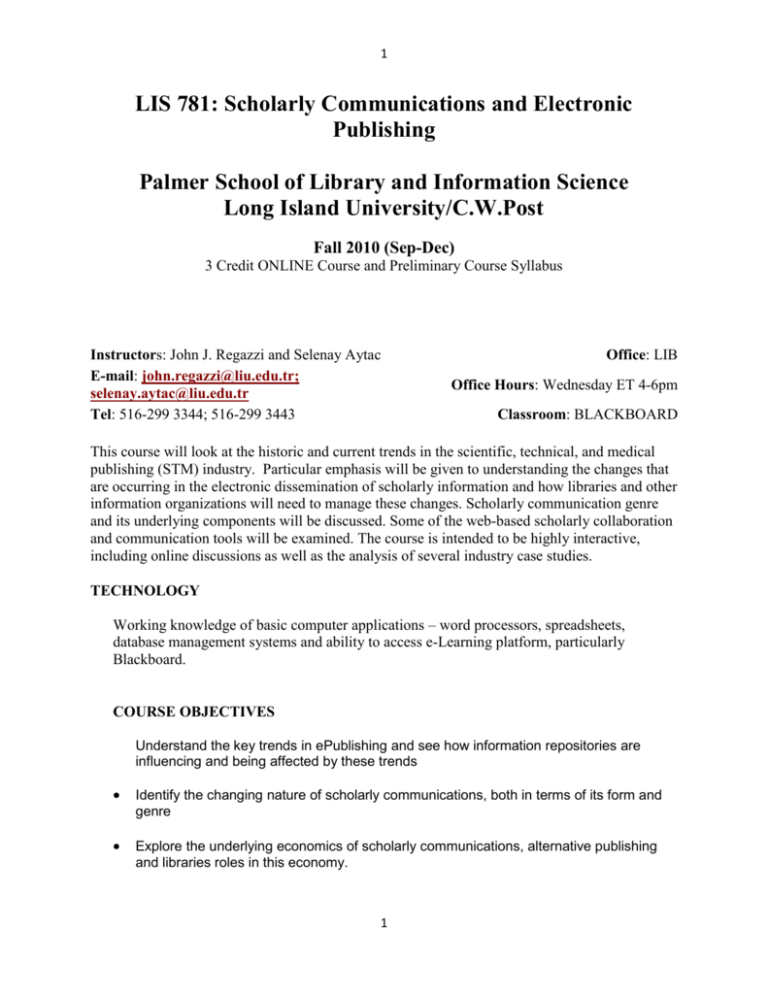
1 LIS 781: Scholarly Communications and Electronic Publishing Palmer School of Library and Information Science Long Island University/C.W.Post Fall 2010 (Sep-Dec) 3 Credit ONLINE Course and Preliminary Course Syllabus Instructors: John J. Regazzi and Selenay Aytac E-mail: john.regazzi@liu.edu.tr; selenay.aytac@liu.edu.tr Tel: 516-299 3344; 516-299 3443 Office: LIB Office Hours: Wednesday ET 4-6pm Classroom: BLACKBOARD This course will look at the historic and current trends in the scientific, technical, and medical publishing (STM) industry. Particular emphasis will be given to understanding the changes that are occurring in the electronic dissemination of scholarly information and how libraries and other information organizations will need to manage these changes. Scholarly communication genre and its underlying components will be discussed. Some of the web-based scholarly collaboration and communication tools will be examined. The course is intended to be highly interactive, including online discussions as well as the analysis of several industry case studies. TECHNOLOGY Working knowledge of basic computer applications – word processors, spreadsheets, database management systems and ability to access e-Learning platform, particularly Blackboard. COURSE OBJECTIVES Understand the key trends in ePublishing and see how information repositories are influencing and being affected by these trends Identify the changing nature of scholarly communications, both in terms of its form and genre Explore the underlying economics of scholarly communications, alternative publishing and libraries roles in this economy. 1 2 Identify the changing user requirements of scholars in their use of formal information systems and being familiar with the current web-based scholarly communication tools Understand the shifts that are occurring in the scholarly community in the production and dissemination of scientific, technical, and medical information. Identify the major legal issues surrounding the profession of librarianship and the management of library systems in terms of scholarly communication– including intellectual freedom, ethics and the role of professional organizations. PALMER SCHOOL OBJECTIVES MET BY THIS COURSE articulate the mission of the library and information professional in the context of the constituency served (scholarly communications community); identify the information needs of society through the application of principles of organization, selection, and evaluation of scholarly information resources; exhibit comprehension of the varied missions and organizational patterns in libraries and information agencies and their inter-relationships; recognize the importance of the contributions of other fields of knowledge to the profession, of ethical behavior, and commitment to the ideals of intellectual freedom. DELIVERY METHODS ONLINE, 3 credit graduate Course, Asynchronous course delivery using Blackboard, however, only required synchronized interactive session between instructors and students is scheduled for September 8, 2010 EST 6pm-7:50pm. Online lecturing and podcasts through Blackboard. Please contact to C.W.Post technology Office at (516) 299-3636 or email to selenay.aytac@liu.edu if you have any question. Online demonstrations of Web of Science, SCOPUS, Google Scholar, JSTORE, CITE, researcher ID, etc. CONTACT HOURS 3 hrs./week lecture x 15 weeks = 45 hours lecture/reading course presentations 6 hrs./week supplementary reading /assignments* = 84 hours 2 hr./week participation in online discussions/doing research = 28 hours 2 3 Total = 157 hours of instruction + supplementary assignments + Research + Participating Online Discussions * supplementary reading /assignments consist of Readings= 2 hours Research Project= 2 hours Assignments= 2 hours COURSE EXPECTATIONS This course heavily involves student participation You are expected to participate in all online sessions in this course. Use one of the citing styles (please be consistent) to list sources in your projects or papers; for more information please visit: (http://www.liu.edu/cwis/cwp/library/workshop/citation.htm). Please be advised of C.W. Post Academic Conduct Policy: The Academic Conduct Policy of the C.W. Post Campus promotes an academic community characterized by respect, honesty, originality, and fairness. Academic misconduct such as plagiarism, cheating, fabrication, sabotage or assisting someone in the committing of any of the acts, is a violation of this Policy. Any student found engaging in academic misconduct is subject to disciplinary action. Plagiarism is a practice that is not only unacceptable, but which is to be condemned in the strongest terms possible on the basis of moral, educational and legal grounds. Under University policy, plagiarism may be punishable by a range of penalties up to and including failure in the course and expulsion from the University." (Long Island University, Graduate Bulletin 2005-2007, p.108) For more information please visit at http://www.liu.edu/cwis/cwp/library/exhibits/plagstudent.htm Please be advised that IRB approval is required if human subjects are involved in student research activities include, but are not limited to, class projects, final papers, masters theses, or doctoral dissertations. For more information please visit at http://www.liu.edu/but01/admin/sr/human.html COPYRIGHT GUIDELINES 3 4 Please feel free to post a URL to a Web site of interest in the discussions or Blog, but do not post any copyrighted material in any online classroom discussions or Blog without the express permission of the copyright owner. ATTENDANCE Please remember that the course attendance will be taken electronically through your participation in postings each week. Postings will be required - at least one message posting for every course discussion and each required reading during the consecutive course schedule. You are expected to participate in the online class discussions in a substantive way by posting at least one or two substantive notes in order to meet attendance requirements. Please also respond your classmates’ posts constructively and professionally. READINGS Most of the required readings will be available from the C.W. Post Library and/or Online Reserve. You will be also asked to read additional course materials which will be listed in the syllabus as well. ASSIGNMENTS The Final Grade for the course will be made up of the following: (1) Final project--50% Students will have an opportunity to carry out a research project and present it (Doctoral students and MLS holders may replace the final project with a research paper); and (2) Attendance and Participation--20%; (3) cases and assignments for the hands-on sessions—30% to assess the online sessions productivity. These three assignments should be submitted after the completion of Online Blackboard sessions. More details on the assignments will be provided in class. GRADING A AB+ B BC+ C CD F 4.00 3.67 3.33 3.00 2.67 2.33 2.00 1.67 1.00 (UNDERGRADUATE ONLY) 0.00 4 5 SCHEDULE AND READINGS Overview of the Industry Week 1—September 8, 2010 EST 6pm-7:50pm -- (This is the only required one synchronized interactive session between instructors and students) A history (and purpose) of primary scholarly communications, i.e., journal publishing LIS 901 Lecture 1.pptx Readings: 1. Information through the printed word : the dissemination of scholarly, scientific, and intellectual knowledge. 1978-1980. Edited by Fritz Machlup, Kenneth Leeson, and associates. New York : Praeger Publishers. 2. The implications of information technology for scientific journal publishing [electronic resource] : a literature review / Amy Friedlander and Rändi S. Bessette, Arlington, VA : Division of Science Resources Statistics, Directorate for Social, Behavioral, and Economic Sciences, National Science Foundation, [2003] Available at: 3. http://www.nsf.gov/statistics/nsf03323/pdf/nsf03323.pdf 4. The web of knowledge : a festschrift in honor of Eugene Garfield. 2000. Edited by Medford, N.J. : Information Today. 5. Donohue, Joseph C. 1974. Understanding scientific literatures: bibliometric approach, Cambridge,MIT Press. Week 2 -- The rise and development of secondary services, especially A&I services and bibliometric analysis; and their shifting sands. Shifting sands: ..\LIS 513 Fall 2009\LIS 513 Fall 2009 Week 7.pptx Readings: 1. Scholarly publishing in an electronic era. 2005.Edited by G.E. Gorman. London: Facet Pub. 2. Gabriel, Michael. 1989. A guide to the literature of electronic publishing :CD-ROM, desktop publishing, and electronic mail, books and journals, Conn. :Jai Press. 3. Regazzi, John J. The Shifting Sands of Open Access Publishing, a Publisher's View 5 6 4. Regazzi, John J. “The battle for mindshare: A battle beyond access and retrieval” 2004 Miles Conrad Memorial Lecture, February 23, 2004, Information Services and Use, Volume 24, Number 2/2004, p 83-92. Week 3 -- The business of electronic publishing – a case study of Encyclopedia Britannica Case Outline: ..\LIS 513 Fall 2009\LIS 513 Fall 2009 Week 8.pptx Readings: 1. Tyckosom, David A. 1992. Eugene Garfield’s contribution to bibliography: science citation index. In Distinguished classics of reference publishing.Edited by James Rettig Oryx Press. Pp. 234-241. 2. Schroter, S. 2005. Perception of open access publishing: interviews with journal authors. British Medical Journal, 330: 756. http://dx.doi.org/10.1136/bmj.38359.695220.82 3. Digital scholarship in the tenure, promotion, and review process. 2004. Edited by Deborah Lines Andersen. Armonk, N.Y. : M.E. Sharpe. Understanding and analyzing current ePublishing Market demands Week 4 -- The changing needs of authors, researchers, and readers Selenay and John research: ..\e Publishing\ALPSP Metro Presentation.ppt Some key findings (needs introduction): ..\e Publishing\Class Lecture Day 3.2 final.ppt Readings: 1. Regazzi, John J and Selenay Aytac. 2007. Author-perceived quality characteristics of science, technology and medicine (STM) journals, Brighton : Association of Learned and Professional Society Publishers. 2. Regazzi, J. J. and Caliguiri, N. A. 2006. Publisher and author partnerships: a changing landscape. Learned Publishing, 19: 183-92. http://dx.doi.org/10.1087/095315106777877485 Assignment #1: Due TBA Week 5 -- Developing strategic initiatives in today’s information marketplace Readings: 6 7 1. Bensman, Stephen J. 2007. Garfield and the impact factorpp.93-125. In ARIST vol. 41.?Edited by Blaise Cronin. Medford, Information Today. 2. Tibbitts, G. 2006. Measuring quality in journal publishing: new and emerging methods. Presentation at International Academy of Nurse Editors conference, London, August 2003. Available at http://www.blackwellpublishing.com/press/files/2006_08August03_INANE_Conference_Londo n_GTV2.ppt 3. Saha, S. et al. (2003). Impact factor: a valid measure of journal quality? Journal of the Medical Library Association 91: 42-6. Available at http://www.pubmedcentral.nih.gov/picrender.fcgi?artid=141186&blobtype=pdf Week 6 -- Case study: understanding a key information services product using Porter’s five market forces Readings: 1. Garfield, E. 1955. Citation indexes to science: a new dimension in documentation through association of ideas. Science, 122: 108-11. http://dx.doi.org/10.1126/science.122.3159.108 Assignment #2: Due TBA Alternative Scholarly Publishing Models Week 7 -- The emergence of Open Access, Public Access, and related Models Overview from PLOS: ..\e Publishing\EPub Open Access.ppt and ..\e Publishing\EPub Open Access 2.ppt Example of trends: University of Ottawa among North American leaders as it launches open access program | News Releases & Announcements | University of Ottawa Media Room Readings: Curtis, Donnelyn. 2005. E-journals : a how-to-do-it manual for building, managing, and supporting electronic journal collections. New York : Neal-Schuman Publishers. 7 8 Week 8 -- The economics of ePublishing – subscriptions, transactions, author fees, and the “business of free” Readings: 1. Rowlands, I. and Nicholas, D. New journal publishing models: an international survey of senior researchers. London, CIBER, 2005. Available at http://www.ucl.ac.uk/ciber/ciber_2005_survey_final.pdf 2. Nisonger, T. E. 2007. Journals in the core collection: Definition, identification, and applications. The Serials Librarian, 51(3-4), 51-73. 3. http://www.library.cornell.edu/scholarlycomm/openaccessday.html Week 9 -- Economics of ePublishing: Case Study; TBA Readings: 1. Rowlands, I. et al. Scholarly Communication in the digital environment: what do authors want? London, CIBER, 2004. Available at: http://www.ucl.ac.uk/ciber/ciber-pa-report.pdf. Changing user behaviors and the products that drive these Week 10 -- The state of the scholarly database – navigation and full text services Overcoming barriers: access to research information | Research Information Network Readings: 1. Derricourt, Robin. 1996. An author's guide to scholarly publishing, Princeton, N.J. : Princeton University Press. 2. Scholarly publishing : books, journals, publishers, and libraries in the twentieth century. 2002. Edited by Richard E. Abel, Lyman W. Newlin ; editors-in-chief, Katina Strauch, Bruce Strauch, New York : Wiley. 3. Nisonger, T. E., & Davis, C. H. (2005). The perception of library and information science journals by LIS education deans and ARL library directors: A replication of the Kohl-Davis study. College & Research Libraries, 66(4), 341-377. 8 9 Week 11 -- Semantic search in scholarly publishing Readings: 1. Bellis, Nicola De. 2009. Bibliometrics and citation analysis : from the Science citation index to cybermetrics , Lanham, Md. : Scarecrow Press. 2. Egghe, Leo. 2005. Power laws in the information production process : Lotkaian informetrics, Amsterdam ; New York : Elsevier/Academic Press. Assignment #3: Due Week 12 -- Knowledge management vs. Social networking Readings: 1. Electronic publishing plus :media for a technological future. 1985. Edited by Martin Greenberger.Washington, D.C.] :Washington Program--Annenberg School of Communications ;White Plains, N.Y. :Knowledge Industry Publications. 2. Wolfram, Dietmar. 2003. Applied informetrics for information retrieval research, Westport, Conn. : Libraries Unlimited. Week 13 -- Case Study: the value proposition around professional social networks Class Presentations Week 14 -- Shared learnings: Presentation and Discussion of Student Papers (Uploading individual papers and presentations to Blackboard for peer-review of your cohorts Week 15 – Final Exam: Evaluation ADDITIONAL READINGS 1. Print vs. digital : the future of coexistence. 2007. Edited by Sul H. Lee Binghamton, NY: Haworth Information Press. Avalable online http://www.informaworld.com/smpp/title~db=all~content=g902762595 2. Borgman, Christine L. 2007. Scholarship in the digital age : information, infrastructure, and the Internet, Cambridge, Mass.: MIT Press, c2007. 9 10 3. Willinsky, John. 2006. The access principle : the case for open access to research and scholarship, Cambridge, Mass. : MIT Press. 4. Scholarly publishing : books, journals, publishers, and libraries in the twentieth century. 2002. Edited by Richard E. Abel, Lyman W. Newlin ; editors-in-chief, Katina Strauch, Bruce Strauch. New York : Wiley. 5. Technology and scholarly communication. 1999. Edited by Richard Ekman and Richard E. Quandt Berkeley, Calif. : University of California Press ; [Pittsburgh?] : Published in association with the Andrew K. Mellon Foundation. 6. King, C.J. et al. Scholarly communication: academic values and sustainable models. Berkeley CA, Center for Studies in Higher Education, 2006. Available at http://cshe.berkeley.edu/publications/docs/scholarlycomm_report.pdf 7. Björk, B-C. and Holmstrom, J. 2006. Benchmarking scientific journals from the submitting author’s viewpoint. Learned Publishing, 19: 147-55. http://dx.doi.org/10.1087/095315106776387002 8. Chung, H. K. 2007. Evaluating academic journals using impact factor and local citation score. The Journal of Academic Librarianship, 33(3), 393-402. 9. Nisonger, T. E. 2004. The benefits and drawbacks of impact factor for journal collection management in libraries. The Serials Librarian, 47(1-2), 57-75. 10. Pancheshnikov, Y. 2007. A comparison of literature citations in faculty publications and student theses as indicators of collection use and a background for collection management at a university library. The Journal of Academic Librarianship, 33(6), 674-683. 11. Vallmitjana, N., & Sabat, L. G. 2008. Citation analysis of Ph.D. dissertation references as a tool for collection management in an academic chemistry library. College & Research Libraries, 69(1), 72-81. 12. Tibbitts, Gordon. (2006). Measuring quality in journal publishing: new and emerging methods, Available at http://www.blackwellpublishing.com/press/files/2006_08August03_INANE_Conference_Londo n_GTV2.ppt 13. Meho, L. I. 2006. E-mail interviewing in qualitative research: A methodological discussion. Journal of the American Society for Information Science and Technology, 57(10), 1284-1295. 14. Scholarly communication in science and engineering research in higher education. 2004. Edited by Wei Wei. Haworth Information Press. Available at http://www.informaworld.com/smpp/title~db=all~content=g902667768 Scholarly Electronic Publishing Bibliography Charles W. Bailey, Jr. http://www.digitalscholarship.com/sepb/sepb.html FREE Resources at ISI available at 10 11 http://thomsonreuters.com/business_units/scientific/free/#scholarly_literature Researcher ID at http://www.researcherid.com/ EndNoteWeb https://www.myendnoteweb.com/EndNoteWeb/2.7/release/EndNoteWeb.html?Init=Yes&SrcApp=CR& returnCode=ROUTER.Success&SID=1EkGJ6pDd1BebdB1iNO Citation Mapping http://isiwebofknowledge.com/products_tools/multidisciplinary/webofscience/citmap/ ISI Web of Knowledge (WOS) Dr. Garfield Library--http://www.garfield.library.upenn.edu/ Budapest Open Access Initiative http://www.soros.org/openaccess Evidence Based Library and Information Practice: an open access, peer reviewed journal published quarterly by the University of Alberta Learning Services and supported by an international team of editorial advisors. The following MIT Podcasts are available from URL and-researchers/podcasts/ http://info-libraries.mit.edu/scholarly/faculty- In “MacKenzie Smith on Endnote vs. Zotero: the Business End of Citation Management Software,” MacKenzie Smith, Associate Director for Technology in the MIT Libraries. In “Gari Clifford on Choosing Open Publication Models that Support Authors and Readers,” In “Professor Dan Ariely on his book “Predictably Irrational” and Scholarly Publishing In “Professor John H. Lienhard V on making his text book open access,” In “John Wilbanks on Barriers to the Flow of Scientific Knowledge,” In “Professor Kai von Fintel on the Launch of a New Open Access Journal in Linguistics,” In “Professor Eric von Hippel on Openness, Innovation, and Scholarly Publishing,”, In “Transforming Scientific Communication,” Steve Gass, Head of Public Services http://libraries.mit.edu/video/scholarly/part1/ Addition Resources from Cornell University Library http://www.library.cornell.edu/scholarlycomm/resources/ 11
